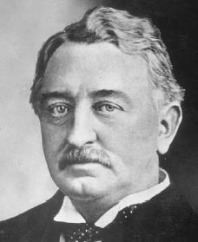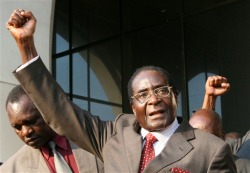Zimbabwe: Struggle for Independence
Ramina Moushi
Zimbabwe has gone through tough times when it was under European colonization, all of Africa was. But what, specifically, made Zimbabwe what it is today? What tough obstacles did the natives of Zimbabwe have to go through to gain their independence?
It all started when Zimbabwe was known as Rhodesia, after Cecil Rhodes, who was from Great Britain (Abc-Clio). When Zimbabwe was known as Rhodesia, it was governed by white minority rule (Britannica Online). For a while, Rhodesia strived for independence from the British minority, but the British still dominated the country. After plenty of stressful, difficult years of being held under British rule, Rhodesia decided enough is enough.
During the 1970’s, the black African majority at last took over its country. After a long civil war, in 1976, Rhodesia was renamed Zimbabwe. One leading man who led Zimbabwe to its independence was Robert Mugabe (Abc-Clio). Since then, he has brought only happiness and freedom to Zimbabwe. In 1980, Mugabe was elected head of state, and still is today (Abc-Clio). Also in the 1980’s, the country gained its international recognition not as Rhodesia, but it’s new name, Zimbabwe.
The people of today’s Zimbabwe are much happier than they were when Britain was in charge. Different varieties of languages are spoken, and the indigenous natives are not just Zimbabweans. Most of Zimbabwe speaks the language of Shona, which is the dominant language of Zimbabwe. But there are some people that speak Ndebele, which is similar to the language of Shona because they are both Bantu languages. Bantu-speaking people have lived around and populated Zimbabwe for over ten centuries and continue to spread their native languages (Britannica Online).
Zimbabwe’s independence not only made an impact on the people of Zimbabwe, but to Africa as a continent. It was one step closer to having a completely independent homeland for the natives. Soon, they would have an environment to themselves, so they can celebrate day by day being safe with their families, and not having to take orders from a European nation.
It all started when Zimbabwe was known as Rhodesia, after Cecil Rhodes, who was from Great Britain (Abc-Clio). When Zimbabwe was known as Rhodesia, it was governed by white minority rule (Britannica Online). For a while, Rhodesia strived for independence from the British minority, but the British still dominated the country. After plenty of stressful, difficult years of being held under British rule, Rhodesia decided enough is enough.
During the 1970’s, the black African majority at last took over its country. After a long civil war, in 1976, Rhodesia was renamed Zimbabwe. One leading man who led Zimbabwe to its independence was Robert Mugabe (Abc-Clio). Since then, he has brought only happiness and freedom to Zimbabwe. In 1980, Mugabe was elected head of state, and still is today (Abc-Clio). Also in the 1980’s, the country gained its international recognition not as Rhodesia, but it’s new name, Zimbabwe.
The people of today’s Zimbabwe are much happier than they were when Britain was in charge. Different varieties of languages are spoken, and the indigenous natives are not just Zimbabweans. Most of Zimbabwe speaks the language of Shona, which is the dominant language of Zimbabwe. But there are some people that speak Ndebele, which is similar to the language of Shona because they are both Bantu languages. Bantu-speaking people have lived around and populated Zimbabwe for over ten centuries and continue to spread their native languages (Britannica Online).
Zimbabwe’s independence not only made an impact on the people of Zimbabwe, but to Africa as a continent. It was one step closer to having a completely independent homeland for the natives. Soon, they would have an environment to themselves, so they can celebrate day by day being safe with their families, and not having to take orders from a European nation.
Works Cited
George, Kurain. "Zimbabwe." Gale Virtual Reference Library. 2007. 4 May 2009
<http://ntesx01-lic.nths.net:2094/gvrl/
retrieve.do?contentSet=EBKS&resultListType=RESULT_LIST&qrySerId=Locale%8en%2C%2C
%29%3AFQE%3D%28KE%2CNone%2C8%29Zimbabwe%24&sgHitCountType=None&inPS=true&sort=Rel
evance&searchType=BasicSearchForm&tabID=T001&prodId=GVRL&searchId=R1¤tPosit
ion=5&userGroupName=winn16583&docId=CX3448200233&docType=EBKS&cont entSet=EBKS#sou
rceCitation>.
I used this source to get general information about Zimbabwe and its independence. I used dates from this source, also names like Cecil Rhodes and Rhodesia.
(No author listed)"Zimbabwe." Abc-Clio. 29 Apr. 2009 <http://www.worldgeorgraphy.abc-clio.com/
countries/Display.aspx?countryid:218>.
This source gave me information about Robert Mugabe and Zimbabwe’s “race to independence.”
(No author listed)"Zimbabwe." Encyclopedia Britannica Online. 2009. 29 Apr. 2009
<http://search.eb.com/eb/article-9109721>.
I used this source to find the languages of Zimbabwe. It gave me the information about the language of Shona, Ndebele, and the general idea of the Bantu-speaking country, Zimbabwe.
<http://ntesx01-lic.nths.net:2094/gvrl/
retrieve.do?contentSet=EBKS&resultListType=RESULT_LIST&qrySerId=Locale%8en%2C%2C
%29%3AFQE%3D%28KE%2CNone%2C8%29Zimbabwe%24&sgHitCountType=None&inPS=true&sort=Rel
evance&searchType=BasicSearchForm&tabID=T001&prodId=GVRL&searchId=R1¤tPosit
ion=5&userGroupName=winn16583&docId=CX3448200233&docType=EBKS&cont entSet=EBKS#sou
rceCitation>.
I used this source to get general information about Zimbabwe and its independence. I used dates from this source, also names like Cecil Rhodes and Rhodesia.
(No author listed)"Zimbabwe." Abc-Clio. 29 Apr. 2009 <http://www.worldgeorgraphy.abc-clio.com/
countries/Display.aspx?countryid:218>.
This source gave me information about Robert Mugabe and Zimbabwe’s “race to independence.”
(No author listed)"Zimbabwe." Encyclopedia Britannica Online. 2009. 29 Apr. 2009
<http://search.eb.com/eb/article-9109721>.
I used this source to find the languages of Zimbabwe. It gave me the information about the language of Shona, Ndebele, and the general idea of the Bantu-speaking country, Zimbabwe.
Last updated by Ramina Moushi on 5/21/09


